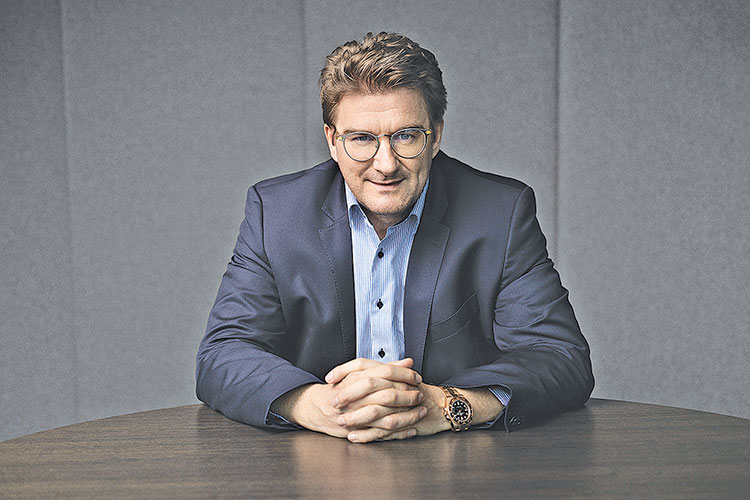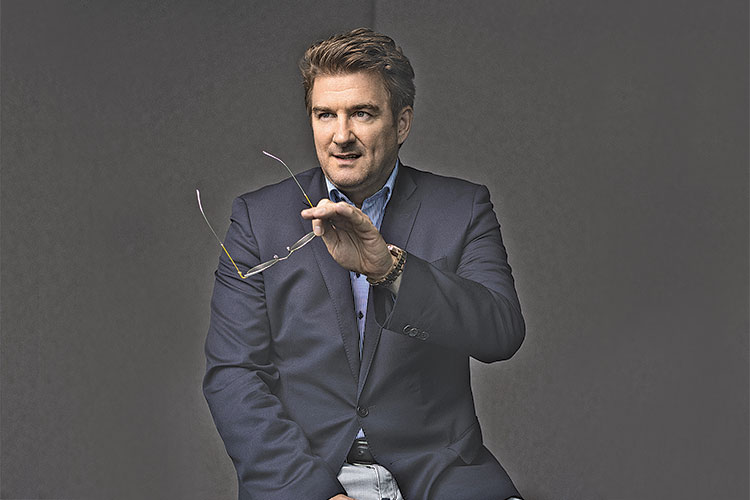There are great opportunities for cooperation between German and Serbian companies, and both sides are ready to use those opportunities. German companies that currently operate in the country are satisfied with the productivity and motivation of their employees, while new prospective investors are increasingly looking for Serbian suppliers specifically
German companies are increasingly considering Serbia under the scope of their strategies to secure nearshoring suppliers, says Udo Eichlinger, President of the German-Serbian Chamber of Commerce (AHK Serbia). Indeed, he notes, over the past year AHK has observed that more German companies are looking specifically for suppliers from Serbia.
“This is certainly done from two points of view: on the one hand, we have positioned Serbia as part of the Western Balkans purchasing initiative as a supplier market for Germany. On the other hand, we find that German companies base their purchasing strategy on different pillars,” says Eichlinger. “Here again, the proximity to the EU and good quality structure of Serbian products offer themselves”.
According to our interlocutor, the focus is currently on the metal processing industry, mechanical engineering, IT and the food industry. The metal processing industry accounts for almost 40% of Serbia’s manufacturing exports and is experiencing continuous growth. In the IT industry, Serbia has established itself as an outsourcing location for software, telecommunications and consulting services. Serbia has very favourable climatic conditions for a wide variety of agricultural products, experienced and quality-conscious manufacturers, suitable expertise and food technicians, as well as a globally recognised selection of various plant products. “We should continue to market these positive aspects in order to use the advantages of a realignment in the purchasing area,” says Eichlinger.
What criteria would you cite as being decisive in choosing an investment destination?
The availability of professional staff is nowadays one of the most important factors in a company’s decision to invest in a particular country. This is exactly the chance for Serbian education to turn learning through work into a competitive advantage in attracting foreign investments, which contribute greatly to the Serbian economy. In addition to that, a concentration of sectors in the same area can ease efforts at developing the required talents. Training and school resources can be bundled and a joint definition of required skills can improve the content of curricula.
At Siemens we are particularly proud of our Mobility factory in Kragujevac, which produces trams and components for light rail vehicles. Many projects are underway and a lot of trams will be produced here and used throughout Europe
If you were to rank the factors that attract investors in terms of importance – from an improved business environment, the rule of law, good geographical connectivity and others – how would subsidies rank on your list and why?
Thanks to the demanding economic reforms it has implemented in the previous period, Serbia has positioned itself as one of the most important investment destinations in Central and Eastern Europe. Attracting foreign direct investment, mainly through the investments of multinational companies, is seen as a way to transfer knowhow, technology and business organisation to domestic companies, as well as to increase labour demand and increase exports. Due to the connection of domestic companies with foreign investors and their inclusion in the value chain, their productivity and product quality increase. It is necessary to make the most of the key advantages of Serbia, which are embodied in its regional position and preferential access to the markets of East and West, human resources, and to persevere in improving the business environment. For many major investors, in their final decisions concerning investment location, infrastructure, the education of workers, the proximity of the market and the possibility of protecting contracts and property were more important than subsidies.
It also needs to be noted that subsidies are also available to Serbian companies in the same way. Taking subsidies or not is definitely a business decision and a need of both foreign or local companies. For example, Siemens in Serbia did not take subsides, due to our business concept of having sustainable operations. But where there is a different approach, it is definitely beneficial to have this kind of support and commitment to the EU principles of free competition and equality.
According to the Government of Serbia, we are no longer a country of cheap labour. Does this concur with the perspective of German companies doing business in our country? What do they see as being the most important criteria?
Serbia is of great interest to the German economy, both as a procurement and sales market and as a production location. There are great opportunities for cooperation between German and Serbian companies, and both sides are ready to use those opportunities. Numerous factors that could be of great interest to potential German partners are noteworthy, including the free trade agreement with the EU, a productive and high-quality labour market, state subsidies and good logistical connections to Central and Western Europe. Having said that, we also find it important that jobs are also created for less skilled people to achieve inclusive growth of the economy.

Your member survey for this year showed that AHK Serbia member companies are extremely satisfied, while the list of key challenges that they identify still includes the business climate, legal framework and corruption. Have your members noticed any positive shifts in these areas, and, if so, where?
Exactly, the results of the latest survey conducted by the German-Serbian Chamber of Commerce in March and April show optimism. Satisfactory assessments of German-Serbian companies were given to criteria related to the labour market in Serbia: companies are satisfied with the productivity and motivation of employees, their qualifications, academic education and dual education, and for the first time the list of positive factors includes the tax system and tax management.
Unfortunately, it needs to be noted that Transparency International’s research shows no change in the corruption index. We have addressed this with the Serbian government on various occasions and offer our assistance to improve the business environment to a sustainable level.
Serbia has an ever-increasing problem when it comes to retaining its educated and talented young workers. What do you think is the cure to this brain drain?
German companies are committed to Serbia. German companies transfer certain values to their way of doing business. I just want to mention that we run an additional health programme that gives a great benefit to our employees. We find that a working healthcare system and good infrastructure – not only in the larger cities, but also in rural areas – are key to avoiding a certain brain drain.
By using innovation, we can truly change people’s lives with solutions for the future, which really makes us an attractive employer
How do you attract educated personnel at Siemens specifically?
Nowadays it isn’t always easy. It became a challenge to attract engineers to our area of business, since it is predominantly one of the most in-demand occupations of the last decade. But, to tell you the truth, we consider ourselves lucky, as employees choose us on many occasions. That’s not just a phrase, but something that Siemens has been working on for more than 170 years. We have almost 400,000 employees worldwide and we’re all bound by the same principle: to work for a company that cares about people, about the work-life balance, about society. Needless to say, our company is among the world’s most innovative companies. Using innovation, we can truly change people’s lives with solutions for the future, which really makes us an attractive employer, wouldn’t you agree?

We are increasingly seeing German companies heading to Serbia’s interior. With the exceptions of Belgrade and Novi Sad, which of the country’s industrial centres would you single out and why?
German industry is present in all parts of Serbia – more than 70,000 people are employed at about 400 German companies. For example, more than 50 German companies operate in Vojvodina By using innovation, we can truly change people’s lives with solutions for the future, which really makes us an attractive employer alone. Each region brings with it some benefits. There are numerous opportunities to establish cooperation with Niš, Čačak, Zaječar and Kragujevac, and here we are primarily referring to areas like the automotive, textile, IT and some other industries. At Siemens we are particularly proud of our Mobility factory in Kragujevac, which produces trams and components for light rail vehicles. Complete trams are manufactured in Serbia. Many projects are underway and a lot of trams will be produced here and used throughout Europe.
Do you consider Serbia as being on the right track when it comes to keeping pace with the Fourth Industrial Revolution and digitalisation? Apart from the building of eGovernment structures, do you see any domains of the industrial sector that could represent good examples of this transformation?
I must say that the Government of the Republic of Serbia has recognised the importance of digitalisation, which has contributed to significant development in this area over the past few years. The Government has acknowledged the importance of investing in this as great capital for economic stability and future growth. Digitalisation, as one of the priorities of the Government of the Republic of Serbia, transforms everyday work in the public sector and raises its economy, transparency and quality of work.
I believe Serbia should just maintain the good direction it is taking by nurturing a positive business climate in the country, which proved to be extremely stable, even under the conditions of the coronavirus pandemic last year, which means a stable GDP this year and certainly the creation of even better conditions for young people and talented individuals who live and work in Serbia, as well as to entice our people who have left Serbia to come back and have good and stable jobs. One aspect of the new normal we have all been living in over the past year and a half is remote working, and with this model it is possible to work from any part of the world in some business areas, so why not use this opportunity and stay in Serbia?
| PROGRESS In the latest survey conducted by the German-Serbian Chamber, the list of positive factors cited by German-Serbian companies includes the tax system and tax management for the first time | FOCUS The focus of German companies in Serbia is on the metal processing industry, mechanical engineering, IT and the food industry | EDUCATION Serbian education has to turn learning through work into a competitive advantage in attracting foreign investments that contribute greatly to the Serbian economy |
|---|